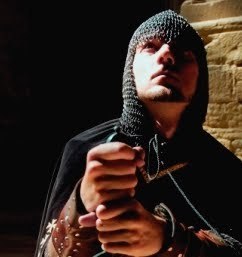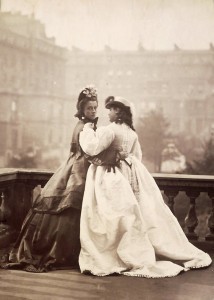V.R. Christensen's Blog, page 9
February 22, 2012
M. Louisa Locke on Flawed Heroines
from Maids of Misfortune and
by M. Louisa Locke
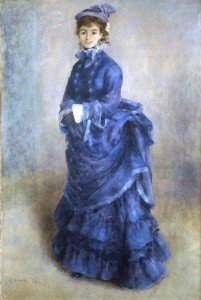 When I was asked to write about flawed heroines, I immediately thought of Annie Fuller, the main protagonist in my two cozy Victorian mysteries, Maids of Misfortune and Uneasy Spirits. Annie is a young widow who lives in 1879 San Francisco and supplements her income as a boarding house owner by giving advice as the clairvoyant Madam Sibyl. As befitting cozy mysteries, my characters and plots don't tend to be too dark, and even my hero (Annie's romantic interest, lawyer Nate Dawson) isn't a typical tortured bad boy in need of reform. But Annie does have her weaknesses, and her extreme independence (or perhaps her fear of being dependent) is the most obvious character flaw because it gets her into the greatest difficulties in both books and leads to a kind of recklessness in her behavior.
When I was asked to write about flawed heroines, I immediately thought of Annie Fuller, the main protagonist in my two cozy Victorian mysteries, Maids of Misfortune and Uneasy Spirits. Annie is a young widow who lives in 1879 San Francisco and supplements her income as a boarding house owner by giving advice as the clairvoyant Madam Sibyl. As befitting cozy mysteries, my characters and plots don't tend to be too dark, and even my hero (Annie's romantic interest, lawyer Nate Dawson) isn't a typical tortured bad boy in need of reform. But Annie does have her weaknesses, and her extreme independence (or perhaps her fear of being dependent) is the most obvious character flaw because it gets her into the greatest difficulties in both books and leads to a kind of recklessness in her behavior.
But as soon as I had that thought, I felt that I had wronged my own creation. How could I call Mrs. Fuller's fiercely independent spirit a flaw? Wasn't I just buying into the prevalent nineteenth century view, called by historians the "Cult of True Womanhood," that said a middle class woman like Mrs. Fuller should be pious, pure, domestic and submissive? Was Annie Fuller truly flawed because she refused to confine herself to the narrow definitions of womanly behavior in that period-particularly the submissive part?
I had consciously made her independent, modeling her on many of the real heroines of the nineteenth century, women like Elizabeth Cady Stanton, Susan B. Anthony, Lucy Stone, and Jane Addams who had challenged the idea that women needed to be dependent and subordinate to men. I purposely gave her a childhood, mirroring the childhood of many of these historic women, that had fostered her sense of competence and equality. Annie Fuller's mother died when she was young and, as a result, she became very close to her father, who treated her like a son and trained her to develop an extraordinary understanding of business and stock speculation. Elizabeth Cady Stanton, for example, had become a surrogate son to her lawyer father when his last remaining male heir died.
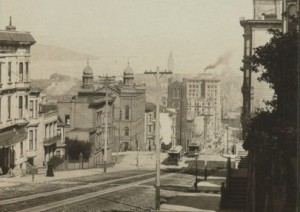 And, for Annie, like many of the women's rights leaders of the nineteenth century, entry into adulthood became a rude awakening and threatened her of sense of confidence and independence. In Annie's case her crisis came with her marriage to a man who belittled and abused her and eventually destroyed her fortune and left her destitute upon his death. What followed was five humiliating years living off the reluctant charity of her in-laws, a not uncommon fate for widowed women of that time. No wonder economic independence would become so important to her. She worked to achieve that independence when she turned an old San Francisco house she inherited into a boarding house. Then, when that income was insufficient, she created the role of Madam Sibyl and developed a lucrative practice as a clairvoyant, using the expertise she had gotten under her father's tutelage to dispense business advice.
And, for Annie, like many of the women's rights leaders of the nineteenth century, entry into adulthood became a rude awakening and threatened her of sense of confidence and independence. In Annie's case her crisis came with her marriage to a man who belittled and abused her and eventually destroyed her fortune and left her destitute upon his death. What followed was five humiliating years living off the reluctant charity of her in-laws, a not uncommon fate for widowed women of that time. No wonder economic independence would become so important to her. She worked to achieve that independence when she turned an old San Francisco house she inherited into a boarding house. Then, when that income was insufficient, she created the role of Madam Sibyl and developed a lucrative practice as a clairvoyant, using the expertise she had gotten under her father's tutelage to dispense business advice.
Not surprisingly, when her economic independence is threatened at the opening of Maids of Misfortune, Annie Fuller is willing to do almost anything to counter that threat, including investigating the death of one of Madam Sibyl's clients, whose assets, including a bequest to Annie, has gone missing. However, her fierce independence, taken too far, also becomes a weakness. In her single-minded determination to remain economically independent, she acts rashly, not thinking of the consequences of those actions. As a result, in the course of her investigations, people's freedom, in some cases their very lives, are jeopardized. Yet she refuses to listen to counsel, particularly when given by Nate Dawson, because she sees his actions in the light of the other men in her life who tried to make her submit to their will. She has confused being dependent with being open to help from someone else.
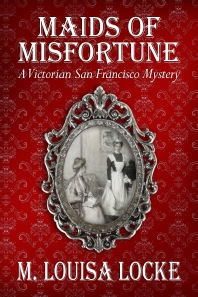 While some readers have grumbled that these struggles between the hero and heroine in my books make Annie too modern, as a professional historian of nineteenth century women, I can assure readers that Annie's fear of dependence was very common. Some women, Like Susan B. Anthony and Sarah Grimke, refused offers of marriage for that very reason. Others, like Lucy Stone, tried to carve out marriages of equality, changing the marriage vows, keeping their own names. Other women challenged public opinion by winning a divorce, as did Laura de Force Gordon, a minor but real historical character in my second book, Uneasy Spirits.
While some readers have grumbled that these struggles between the hero and heroine in my books make Annie too modern, as a professional historian of nineteenth century women, I can assure readers that Annie's fear of dependence was very common. Some women, Like Susan B. Anthony and Sarah Grimke, refused offers of marriage for that very reason. Others, like Lucy Stone, tried to carve out marriages of equality, changing the marriage vows, keeping their own names. Other women challenged public opinion by winning a divorce, as did Laura de Force Gordon, a minor but real historical character in my second book, Uneasy Spirits.
While Annie Fuller's independent nature is understandable, it leads to a fear of dependence in Uneasy Spirits that almost proves her undoing. In this, the second book in the series, she not only pushes Nate away because of her fear that she would lose her independence if she married him, but she pushes away all her friends when she feels they might question her decisions. What she achieves is not independence but a growing isolation, which will ultimately result in threats to her own life.
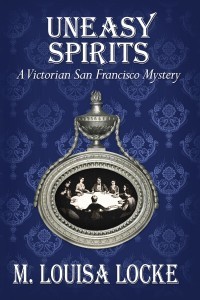 While I have Annie realize some of the ways her behavior has hurt her and others at the end of Uneasy Spirits, I don't think that the problems she face will go away, particularly regarding her relationship with Nate. Nate Dawson, as a man of his time, thinks of his offer of marriage as gift-giving Annie economic security, protection, respectability, a home and family. By in large her friends, including her female friends, agree with him. Annie, on the other hand, fears that marriage will cause her to lose things, her name, her freedom of action, her work, and, most frightening of all, her independence. Whether these different views of marriage can be reconciled will have to be answered in subsequent books in the series, but you can believe me, as Annie's creator, I am not going to squash her reckless and independent spirit, because where would be the fun in that!
While I have Annie realize some of the ways her behavior has hurt her and others at the end of Uneasy Spirits, I don't think that the problems she face will go away, particularly regarding her relationship with Nate. Nate Dawson, as a man of his time, thinks of his offer of marriage as gift-giving Annie economic security, protection, respectability, a home and family. By in large her friends, including her female friends, agree with him. Annie, on the other hand, fears that marriage will cause her to lose things, her name, her freedom of action, her work, and, most frightening of all, her independence. Whether these different views of marriage can be reconciled will have to be answered in subsequent books in the series, but you can believe me, as Annie's creator, I am not going to squash her reckless and independent spirit, because where would be the fun in that!
 M. Louisa Locke is a retired professor of U.S. and Women's History, who has embarked on a second career as an historical fiction writer. The first two published books in her series of historical mysteries set in Victorian San Francisco, Maids of Misfortune and Uneasy Spirits, are bestsellers in the historical mystery category on Kindle. These books feature Annie Fuller, a boardinghouse owner and clairvoyant, and Nate Dawson, a San Francisco lawyer, who together investigate murders and other crimes, while her short stories, beginning with Dandy Detects, give secondary characters from this series a chance to get involved in their own minor mysteries. Dr. Locke is currently living in San Diego with her husband and assorted animals, where, in addition to these short stories, she is working on Bloody Lessons, the next full-length installment of her Annie Fuller/Nate Dawson series.
M. Louisa Locke is a retired professor of U.S. and Women's History, who has embarked on a second career as an historical fiction writer. The first two published books in her series of historical mysteries set in Victorian San Francisco, Maids of Misfortune and Uneasy Spirits, are bestsellers in the historical mystery category on Kindle. These books feature Annie Fuller, a boardinghouse owner and clairvoyant, and Nate Dawson, a San Francisco lawyer, who together investigate murders and other crimes, while her short stories, beginning with Dandy Detects, give secondary characters from this series a chance to get involved in their own minor mysteries. Dr. Locke is currently living in San Diego with her husband and assorted animals, where, in addition to these short stories, she is working on Bloody Lessons, the next full-length installment of her Annie Fuller/Nate Dawson series.
For more about M. Louisa Locke and her work, see http://mlouisalocke.com/. And for other great historical fiction ebooks, check out http://historicalfictionauthors.com/
February 21, 2012
N. Gemini Sasson on Flawed Heroines
from Isabeau, A Novel of Queen Isabella and Sir Roger Mortimer
and the soon to be released sequel, The King Must Die
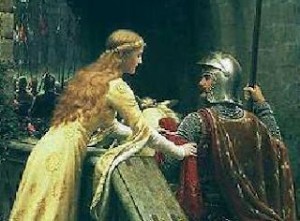 In 1308, Isabella of France married King Edward II of England. She was not yet thirteen. He was twenty-three, a king newly come to his throne. For much of history, Isabella was known as the 'She-Wolf of France', an epithet which far from conjures up an admirable picture of her. But it's not hard to see how she earned the title. She did, after all, go to France in 1325 with the task of negotiating a peace treaty between France and England, take a lover (Roger Mortimer) while there who was a known rebel and traitor to her husband, return to England with him at the head of an invasion force, force the abdication of her husband and then put their son on the throne in his place. Phew! Hmm, and now I'm going to tell you she had redeeming qualities? Flawed? Yes! Heroine? Let me try to convince you.
In 1308, Isabella of France married King Edward II of England. She was not yet thirteen. He was twenty-three, a king newly come to his throne. For much of history, Isabella was known as the 'She-Wolf of France', an epithet which far from conjures up an admirable picture of her. But it's not hard to see how she earned the title. She did, after all, go to France in 1325 with the task of negotiating a peace treaty between France and England, take a lover (Roger Mortimer) while there who was a known rebel and traitor to her husband, return to England with him at the head of an invasion force, force the abdication of her husband and then put their son on the throne in his place. Phew! Hmm, and now I'm going to tell you she had redeeming qualities? Flawed? Yes! Heroine? Let me try to convince you.
When I first began writing about Isabella, it was from Edward's perspective in one of The Bruce Trilogy books, Worth Dying For. I had to learn not just what Edward might have thought about her, but what she was truly like. That led me on a detour and the more I learned about her, the more sympathetic I felt towards her. Their marriage was an arranged one, meant to forge a political alliance between England and France. Four years later, she was pregnant with their first child. They had three more over the next nine years. Eventually, however, Edward's favoritism towards two men, Piers Gaveston and later Hugh Despenser, strained their marriage irreparably.
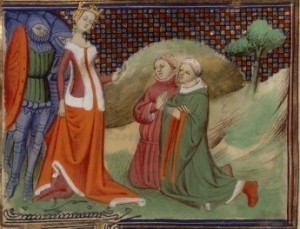 For many years, Isabella tried to maintain a harmonious relationship with her husband. But when Hugh Despenser began to assert himself to the point of influencing Edward to give him titles and land, sometimes at Isabella's expense, things became strained. It reached a breaking point after Roger Mortimer escaped imprisonment in the Tower of London and Isabella, under suspicion, had many restrictions placed on her. For a period of time, she wasn't permitted to travel, nor could she see her children and her income was reduced to a fraction of its former level. A dutiful wife and diplomat for many years, her back was now up to a wall. Can you imagine being in a position like that? Women back then were expected to do as told and not speak up. Divorce was not an option, either.
For many years, Isabella tried to maintain a harmonious relationship with her husband. But when Hugh Despenser began to assert himself to the point of influencing Edward to give him titles and land, sometimes at Isabella's expense, things became strained. It reached a breaking point after Roger Mortimer escaped imprisonment in the Tower of London and Isabella, under suspicion, had many restrictions placed on her. For a period of time, she wasn't permitted to travel, nor could she see her children and her income was reduced to a fraction of its former level. A dutiful wife and diplomat for many years, her back was now up to a wall. Can you imagine being in a position like that? Women back then were expected to do as told and not speak up. Divorce was not an option, either.
So, Isabella took matters into her own hands. She convinced Edward to let her go to France to help with the peace treaty, but once there, she fell deeply in love with Mortimer. He had been married for over 20 years and had twelve children with his wife Joan. But he fell in love with Isabella, too, and couldn't resist the opportunity to have his own revenge on Edward. All these events unfold in my book Isabeau, A Novel of Queen Isabella and Sir Roger Mortimer. The sequel, The King Must Die, which is due out this April, follows events after Edward II's abdication. At this stage, she became more avaricious and even a little manipulative, probably in an attempt to maintain her hold on power. But her greatest flaw, her love for Roger Mortimer, eventually proved to be her downfall.
Isabella was a woman ahead of her time. She stood up for herself in an age when women were not supposed to be outspoken and she did what she thought was for the better, however unpopular it may have later proven. Did she do it in the best manner possible? That's a matter of conjecture. I can't imagine being in her position, trying to make things work and yet feeling utterly powerless. Without a doubt though, she was a woman of determination and great passion.
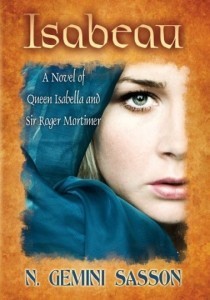 N. Gemini Sasson is the author of The Crown in the Heather (The Bruce Trilogy: Book I), Worth Dying For (The Bruce Trilogy: Book II), The Honor Due a King (The Bruce Trilogy: Book III) and Isabeau, A Novel of Queen Isabella and Sir Roger Mortimer (2011 IPPY Silver Medalist for Historical Fiction). She holds a M.S. in Biology from Wright State University where she ran cross country on athletic scholarship. She has worked as an aquatic toxicologist, an environmental engineer, a teacher and a track and cross country coach. A longtime breeder of Australian Shepherds, her articles on bobtail genetics have been translated into seven languages.
N. Gemini Sasson is the author of The Crown in the Heather (The Bruce Trilogy: Book I), Worth Dying For (The Bruce Trilogy: Book II), The Honor Due a King (The Bruce Trilogy: Book III) and Isabeau, A Novel of Queen Isabella and Sir Roger Mortimer (2011 IPPY Silver Medalist for Historical Fiction). She holds a M.S. in Biology from Wright State University where she ran cross country on athletic scholarship. She has worked as an aquatic toxicologist, an environmental engineer, a teacher and a track and cross country coach. A longtime breeder of Australian Shepherds, her articles on bobtail genetics have been translated into seven languages.
Isabeau, A Novel of Queen Isabella and Sir Roger Mortimer is available in paperback and eBook formats. The sequel, The King Must Die, is set for release in April 2012. Gemini is a member of Historical Fiction eBook and Past Times Books, both excellent sources for Historical Fiction of the highest quality. Check them out! You can also follow her on Twitter and Facebook.
February 20, 2012
Rebecca Lochlann on Flawed Heroines
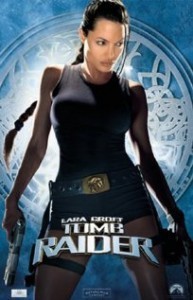 I cannot identify with Lara Croft, (at all) Elektra, Yu Shu-lien, or the myriad other superwomen gracing many books and movies today. To me they are enticing but unrealistic, unattainable. They are almost as bad, in their way, as the Catholic Mary. What mortal woman-of-faith can live up to such spotless virtue (as defined by men?)
I cannot identify with Lara Croft, (at all) Elektra, Yu Shu-lien, or the myriad other superwomen gracing many books and movies today. To me they are enticing but unrealistic, unattainable. They are almost as bad, in their way, as the Catholic Mary. What mortal woman-of-faith can live up to such spotless virtue (as defined by men?)
Let's take Lara Croft. Not only is she completely pure of heart, she is stronger, bolder, more courageous and wiser than any man, anywhere. To top things off, (ha ha) she has gigantic (Freudian) boobs. In the first Tomb Raider movie, Lara uses a familiar karate move (one outstretched leg and foot) to strike a statue that comes to life and attacks her. Any normal human attempting this would find him or herself with a broken leg. The statue is made of solid rock, after all. Not Lara. She actually hurts the statue. The solid rock statue. Then she outruns a four-legged beast-like stone statue without even getting breathless. Later, faced with a choice between doing the "right" thing and doing what she longs to do, she weeps but does the right thing. Of course. There really are no surprises in the Tomb Raider movies. Lara does exactly what you would expect, all the time. Yawn.
In the second Tomb Raider movie, Lara makes a huge issue about how she "needs" Terry Sheridan. She "cannot" accomplish her mission without him. She gets him released from a high-security prison, then, the very first time he is required to make a decision, she refuses to listen to his advice. "We're going to do it this way," she states, and takes off on her motor scooter. Why was he even in this movie? She obviously did not need him so badly, after all. (She was "bold" while he was cautious. Poor, weak, man.)
Another movie that bothered me, although not so blatantly, was King Arthur. Here we have Guinevere, (Keira Knightley), a "warrior babe in face-paint," to quote the Amazon.com editorial review. It's like they tried to make her believable then at some point forgot their goal. The historical Guinevere might have actually been a warrior. Her fighting skills were not a problem for me, neither was her courage. Where I got lost? When she goes into battle in a tiny leather bikini, while her male compatriots are in full body armor. Really?
Now I love fantasy. I love Return of the King, Pan's Labyrinth, V for Vendetta, Ever After, 300, and Final Fantasy: The Spirits Within, all of which contain strong, intelligent, courageous women.
One of my all time favorite movie lines is "I am no man," coldly uttered by Eowyn just before she kills the Nazgul witch-king. This character is allowed to feel and act like a woman, and also fight like a real warrior, trained from childhood, would fight. She is completely believable.
I love strong, intelligent, courageous female characters, and I know for a fact that women, real and fictional, can be believable and strong, intelligent and courageous. They cannot be both believable and invincible. Besides the fact that such a concept is boring.
Ancient Great Britain offers up three women who, though foggy, have managed to not disappear completely from history:
Aife: Queen of Alba, said to be the most famous woman warrior of the Celtic heroic age.
Scathach: One of the greatest warriors and teacher of warriors. Some believe her legend proves there were women's military academies among the Celts.
The renowned Boudica, a historical figure if ever there was one.
More can be read about these women in several books, one of which is: The Encyclopedia of Amazons: Women Warriors from Antiquity to the Modern Era, by Jessica Amanda Salmonson.
Current stories seem inclined to portray women as flawless, lacking even the perfectly normal "flaw" of not having as much physical strength as males. For Aridela, I wanted to create a protagonist who is strong, yes, but real and believable. I wanted to show how she acquires her strength, rather than simply shoving her out there already formed, as if by magic.
 Child of privilege, daughter to the Queen of Crete, she has never known want or suffering. She has never experienced betrayal, humiliation, subterfuge or fear. Ten years old at the book's outset, Aridela is an indulged, sheltered princess. Adventurous, bold, and charismatic, Aridela is inherently ready, yet profoundly unprepared, to take the throne of Crete. The people adore her, her mother dotes on her; she impresses even the hard-nosed royal counselors. Like many of Crete's citizens, Aridela reveres beauty and beautiful things. She doesn't realize how shallow she is, because most around her are the same. The reader might be excused for thinking this child will grow up to be a spoiled, unlikeable woman, emphasis on "spoiled." Naturally, I wanted more for her.
Child of privilege, daughter to the Queen of Crete, she has never known want or suffering. She has never experienced betrayal, humiliation, subterfuge or fear. Ten years old at the book's outset, Aridela is an indulged, sheltered princess. Adventurous, bold, and charismatic, Aridela is inherently ready, yet profoundly unprepared, to take the throne of Crete. The people adore her, her mother dotes on her; she impresses even the hard-nosed royal counselors. Like many of Crete's citizens, Aridela reveres beauty and beautiful things. She doesn't realize how shallow she is, because most around her are the same. The reader might be excused for thinking this child will grow up to be a spoiled, unlikeable woman, emphasis on "spoiled." Naturally, I wanted more for her.
When Aridela meets and crushes on Menoetius, it's easy to understand why. He's a gorgeous, charming, seventeen year old foreigner with a delightful accent. What ten-year-old girl wouldn't fall for a guy like that? But he goes home and Aridela grows up. Now she hankers after another youth—no surprise that the object of her affection is a dazzling, celebrated bull leaper. It's when the warriors of the mainland converge upon Crete, determined to win the Games and become the next bull-king, that real challenges begin chewing away her comfort zone. Chrysaleon, the arrogant prince of Mycenae, introduces Aridela to passion. Again, it's easy to see what draws her: he's good looking and a prince. It takes her awhile to realize the guard he's brought with him is none other than her first love, Menoetius, but a profoundly different Menoetius than the boy she knew. No longer beautiful, he is the first challenge Divine Athene sets in her path. How will she deal with this angry, wounded man? She has no experience with the kind of pain he's suffered. Harpalycus, another mainland prince, introduces her to cruelty and shame. Harpalycus is Aridela's first exposure to humiliation, to fear, to a sense of weakness. He and the other mainland competitors lay bare the encroaching danger of the world outside her safe island paradise.
Aridela, a coddled princess, faces challenges that will either destroy her or incorporate the necessary components needed by all rulers from antiquity to the present: humility, caution, empathy, and compassion. Immortal Athene takes her child into the blackest, deepest pit where life no longer holds value. From that place, Aridela will survive and recover, honed by adversity, or she will become what her oppressors want. Either way, she will be very different from the child who brazenly entered the ring and joyously danced with a wild bull.
I often wonder why is there this need to portray women in the current fashion: invincible, superhuman strength, wise beyond logic, bold beyond reason, unassailable in mental purity? Perhaps because there is a sense that women want to break free of their past, where they have been so openly subjugated. I am only guessing. But if that is the case, is this attempt any more helpful to women than the previous notion (or expectation) that they were chaste, virtuous, pure, untouched, innocent, flighty, silly, and weak? "Creatures," (as they have often been labeled, as in not quite human) who must be protected, guided, and controlled?
For myself, I feel that portraying women as "superwomen" is just another manipulation, the same as when we were expected to be pure, selfless, and silly. Why can't we just be human, real, appreciated for all the wonderful qualities we offer, that have from the beginning made this world a better place?
I want the women in my books to achieve great things under their own mind-power, as real women must do.
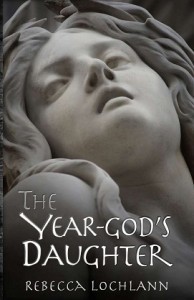 Rebecca fell in love with the stories and myths of the ancient Greeks and wrote her first story at a very early age, due in part to the wonderful children's book, "D'Aulaires' Book of Greek Myths." She honed the craft of writing alongside formal education, marriage, and child rearing. Concurrent with building the series, she owned and operated a successful writing/editing company, helping authors prepare their work for publication and providing hundreds of articles on demand for marketing use and teaching seminars.
Rebecca fell in love with the stories and myths of the ancient Greeks and wrote her first story at a very early age, due in part to the wonderful children's book, "D'Aulaires' Book of Greek Myths." She honed the craft of writing alongside formal education, marriage, and child rearing. Concurrent with building the series, she owned and operated a successful writing/editing company, helping authors prepare their work for publication and providing hundreds of articles on demand for marketing use and teaching seminars.
"The Child of the Erinyes" is mythic historical fiction that begins in the Bronze Age and winds up in the near future.
Writing Influences? Patricia A. McKillip, Margaret Atwood, Anita Diamant, Peter S. Beagle, Anne Rice, and Yevgeny Zamyatin, to name a few.
It took about fifteen years to research the Bronze Age segments of the series, and encompassed rare historical documents, mythology, archaeology, ancient writing, ancient religions, and volcanology. For Rebecca, a rather obsessed historian, the research, the struggle for perfection, never ends.
"The Year-god's Daughter" is her first novel: Book One of "The Child of the Erinyes" Series. "The Thinara King" is scheduled for release in April, 2012. All of Rebecca's books will be published in paperback and eBook forms.
Though she cannot remember actually living in the Bronze Age, the Middle Ages, the Victorian era, and so on, she believes in the ability to find a way through the labyrinth of time, and that deities will sometimes speak to us in dreams and visions, gently prompting us to tell their forgotten stories.
Who knows? It could make a difference.
The Year-god's Daughter is available in paperback and eBook formats. The sequel, The Thenara King, is set for release in April 2012. (I'm very excited about this.) Ms. Lochlann is a member of Historical Fiction eBook and Past Times Books, both excellent sources for Historical Fiction of the highest quality. Check them out! You can also follow her on Twitter and Facebook. Visit Rebecca's website to learn more about her and her work.
February 18, 2012
Just a quick word…
I just want to thank everyone who stopped by to read the series on Flawed Heroes. It was a smashing success and quite fun. My site got record hits and it's all thanks to the readers. But also to the wonderful authors who contributed. Thank you so much, N. Gemini Sasson, Cheri Lasota, Rebecca Lochlann and P.B. Ryan! This was the most fun I've had blogging ever.
I want to continue this theme, as it was so much fun, so next week I'll be hosting a series on the subject of the Flawed Heroine, which I think deserves equal treatment. In no particular order, contributing authors will be N. Gemini Sasson, Rebecca Lochlann, M. Louisa Locke, Gev Sweeney (and myself, of course). Do stop by. I'm looking forward to some thought provoking discussion.
One more thing, before I sign off for the weekend. March will be an exciting month for Of Moths & Butterflies. March 1-3 the Kindle edition will be free on Amazon. And later in the month, I'll have a giveaway for one hardcover, one paperback, and one eBook (in the winner's chosen format). Stay tuned for details on that. I'll announce it again on Moths' Facebook page, so be sure to 'like' it to receive timely update.
***Images in order of appearance: 1) Tyler Nordby as Tristan Vazante. Photo by Beth Furumasu. 2) Archer Hamilton, illustration by B. Lloyd. 3) Info to come. 4) William Butler Yeats by John Singer Sargent. 5) Antinous of Delphi.
February 16, 2012
Flawed heroes – part five
(and the others in the Nell Sweeney Mysteries)
by P.B. Ryan
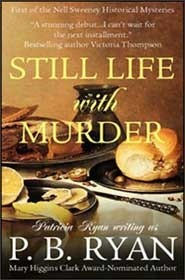 No character that I've ever written has generated as much fascination among my readers as the highly flawed, deadly handsome, dangerously charming Will Hewitt. Will is my governess-sleuth's partner in detection—and love interest, although they dare not speak of it—in the Nell Sweeney historical mysteries, set in post-Civil War Boston.
No character that I've ever written has generated as much fascination among my readers as the highly flawed, deadly handsome, dangerously charming Will Hewitt. Will is my governess-sleuth's partner in detection—and love interest, although they dare not speak of it—in the Nell Sweeney historical mysteries, set in post-Civil War Boston.
The black sheep son of Nell's wealthy employer, Dr. William Hewitt was regarded as the finest battle surgeon in the Union Army before his capture and incarceration at the notorious Andersonville prison camp, where he was reported to have succumbed to dysentery. Four years later, his family is stunned when he turns up alive and accused of a vicious murder he won't deny having committed. Plagued by survivor guilt and the pain of an old bullet wound in his leg, Will roams the world frequenting high-stakes poker games and back-room opium dens, where he seeks blessed oblivion in the arms of Morphia.
When we meet him in book #1 of the series, Still Life With Murder, Will is deeply damaged inside and out, an addict who walks with a limp and doesn't care whether he lives or dies. Bloodied from a police interrogation and in the grips of opium withdrawal, he frightens and disgusts Nell—yet she can't help but be intrigued by his touching protectiveness toward women and his occasional courtesies, which "hint at the gentleman beneath the wretch."
Despite Will's shortcomings, I found him totally captivating, but I thought, well, maybe that's just me. Maybe there's something twisted in my psyche that makes flawed men appealing to me. So imagine my surprise when, following Still Life's publication by Berkley Prime Crime in 2003, I was inundated with mail from readers who were just as in love with him as I was. What, I wondered, would make such a seemingly hopeless piece of work attractive to normal, well-adjusted women?
Will's flaws are both physical and psychological. Let's start off with the physical: the injured leg. Wounded heroes are nothing new in literature, and I recently discussed their appeal with the noted literary historian Susan Koppelman (who, I'm pleased to report, will be delivering a presentation about the Nell Sweeney mysteries at the upcoming national conference of the Popular Culture Association). If the male is historically considered the dominant partner in a heterosexual relationship—as was certainly the case in pre-20th century settings—then an injury would serve to diminish his physical supremacy, putting him on a more equal standing with the heroine.
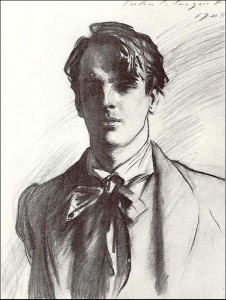 Susan tells me this is considered a metaphorical "gelding" of the hero, and that the symbolism is especially pointed when it's the leg—thought to represent the phallus—that has suffered the injury. Gee, maybe I really am twisted, I thought, since there are three other male protagonists besides Will who've limped their way through my books. Maybe I'm subconsciously castrating my heroes. Or maybe a cigar is just a cigar. After all, not all of my wounded heroes had leg injuries. Or so I reassured myself until Susan laughingly reminded me of my medieval romance The Sun and the Moon, in which the hero is a mercenary knight who had a thumb chopped off, after which he couldn't wield his sword.
Susan tells me this is considered a metaphorical "gelding" of the hero, and that the symbolism is especially pointed when it's the leg—thought to represent the phallus—that has suffered the injury. Gee, maybe I really am twisted, I thought, since there are three other male protagonists besides Will who've limped their way through my books. Maybe I'm subconsciously castrating my heroes. Or maybe a cigar is just a cigar. After all, not all of my wounded heroes had leg injuries. Or so I reassured myself until Susan laughingly reminded me of my medieval romance The Sun and the Moon, in which the hero is a mercenary knight who had a thumb chopped off, after which he couldn't wield his sword.
Thumb. Sword. Oh, dear.
On the other hand… is a little bit of gelding necessarily such a bad thing? Bear with me here. There's been speculation among those who study such things that the irritability, hostility, and mood swings that women sometimes experience during PMS are what men experience pretty much all the time. Which, if true, would make women the more emotionally stable and, dare I say it, civilized sex. By chipping away at the hero's most prominent masculine characteristic—his physical dominance—could it be that we're not symbolically lowering him to the heroine's level, but elevating him to it?
The classic hero is strong of mind as well as of body, and more often than not somewhat self-contained. We've been brought up to feel that real men don't bare their souls. But if the heroine can't penetrate the armor the hero wears around his soul, how can she really know him, much less love him? The answer: create a flaw in the armor, an opening your heroine—and reader—can see into. As Susan Koppelman puts it, "If you think of the hero as a closed container, the only way to know what's inside it is to wound it."
Which brings us to William Hewitt's drug addiction. Judging by hundreds of letters from smitten readers, Will's dependence on opiates does nothing to diminish his appeal; in fact, it may amp it up. I think this is because a psychological flaw, like a physical flaw, can serve in some cases to level the playing field of the relationship. The hero may pretend to be emotionally invulnerable, but we know better.
With a hero whose problems are mental rather than physical, I think it's important to at least hint that he's not completely irredeemable; there's a reason he is the way he is, and there's also the potential for recovery. In Will's case, he started smoking opium to numb the physical pain of his bullet wound, but he persisted in it to deaden memories he couldn't escape any other way—memories in which his courage and valor failed to prevent his brother's tragic death. Will's emotional vulnerability, which he conceals beneath a droll and world-weary façade, tugs at the heart, arousing an instinctive urge to take away the pain that haunts him.
And that brings us to the bottom line: The flawed hero is almost always a fixer-upper. During the course of the story, the heroine often manages to vanquish whatever demons were tormenting him, or even heal his physical wounds, thus restoring the trappings of full manhood—and making him capable of a real relationship. In real life, men who need fixing tend to be Bad News; there are few pursuits as futile as trying to change or improve a loved one. But that's exactly why such a transformation is so thrilling when a fictional female manages to pull it off. By making the hero a better man, physically and/or emotionally, our heroine triumphs—and the reader closes the book with a smile on her face.
About P.B. Ryan
P.B. Ryan(the artist formerly known as Patricia Ryan) is the award-winning author of 27 novels and novellas, which have been published in over 20 countries, including Serbia. That's right, Serbia.
Pat tapped into her fascination with 19th century urban America to create the Nell Sweeney mysteries for Berkley Prime Crime. Set in post-Civil War Boston, the series stars Nell, a young Irish-born governess with a disreputable past that must be kept hidden at all costs. Nell is assisted in her sleuthing by her employer's black sheep son, William Hewitt. A former Union Army battle surgeon, Will is now a professional gambler who smokes opium to dull the pain of his wounds, both inside and out. The reaction of the series' fans to the complicated, slowly evolving relationship between Nell and Will ("the beating heart of the series" as one reader put it) delights Pat, who is deeply wrapped up in them herself. The series has been as popular with critics as with readers, and Murder in a Mill Town was chosen as a finalist for the Mary Higgins Clark Award.
Upon getting the rights back to the six Nell Sweeney books (as well as to six novels of medieval romantic suspense written for NAL), Pat published them in digital format. The first book of the series, Still Life With Murder, has made it to the #1 spot on Amazon's historical mystery bestseller list. In 2010, Pat and fellow author Doranna Durgin launched backlistebooks.com, a showcase of author-published out-of-print ebooks. Once upon a time, Pat worked in the publishing industry as a promotion manager and editor, but she quit her job when she was offered her first publishing contract in 1994, and she's been spending her days making stuff up ever since.
Visit P.B. Ryan's website to learn more about her and her work. Her work is available at Amazon and online wherever books are sold. I'm proud to have met Ms. Ryan through Historical Fiction eBooks, where Historical Fiction of the highest quality is brought together in one source. Check them out! You can also follow Ms. Ryan on Twitter and Facebook.
February 15, 2012
Flawed heroes – part four
by Rebecca Lochlann
 When the Greek youth Menoetius first comes to Crete, he is seventeen, with a young man's smooth skin and lustrous dark hair that ten-year-old Aridela likens to a waterfall. His eyes are what really capture her imagination, however. Cobalt blue like the heavens at twilight, in this land where nearly everyone has eyes of brown or black, they have a glow about them, like the sun shining through deep water, or the star Iakchos, rising above Crete's mountain summits in the fall.
When the Greek youth Menoetius first comes to Crete, he is seventeen, with a young man's smooth skin and lustrous dark hair that ten-year-old Aridela likens to a waterfall. His eyes are what really capture her imagination, however. Cobalt blue like the heavens at twilight, in this land where nearly everyone has eyes of brown or black, they have a glow about them, like the sun shining through deep water, or the star Iakchos, rising above Crete's mountain summits in the fall.
The Goddess lives in his eyes; Aridela, who has communed with this deity from birth, senses it.
Seventeen-year-old Menoetius has an easy smile and affectionate nature. One of the paramount characteristics Aridela loves is his devotion to Potnia Athene, the Mistress of Labyrinthos. The first time this child comes into contact with Menoetius, she is alone, bleeding profusely and near death. He plucks her up from the labyrinth floor and carries her to the courtyard, where she is given over to physicians. If it weren't for that act, Aridela would surely have died at the age of ten, and there would be no story to tell. As she slides between life and death, she peers up at him, half-conscious, and sees those eyes. She believes Goddess Athene is holding her. Fully trusting, she loses all fear of death in the arms of the Goddess.
Who knows what might have happened if Menoetius had remained on Crete, at Aridela's side? His instincts tell him to. But, following his father's orders, he returns to his homeland, and Aridela doesn't see him again for six long years.
One month later, while hunting, Menoetius and his brother are attacked by a lioness. Menoetius survives, but he will never again mesmerize women with his beautiful face. The beast steals something else from him. She extinguishes the singular goddess-light that has always winked and glimmered in his eyes. She leaves little more than scarred flesh over bones. He loses his confidence and devotion. He blames and rejects the Goddess who allowed this to happen. Although he now has her most sacred symbol carved onto his face—the shape of the crescent moon—he believes he is cursed by the Immortal he once adored.
When Menoetius sails to Crete the second time, he is so changed Aridela doesn't even recognize him. She unwittingly verifies every bad thing he  has come to believe about himself. He retreats further, hiding his pain behind a morose exterior. When she is told who he is, she is nearly as traumatized as if she experienced the attack herself.
has come to believe about himself. He retreats further, hiding his pain behind a morose exterior. When she is told who he is, she is nearly as traumatized as if she experienced the attack herself.
Why has Athene done this? Why has she taken a handsome, devout youth who willingly dedicated his life to her, and shoved him into the jaws of an enraged lioness? Why has she made him suffer this way, while leaving his brother, the cynical, arrogant, impious Chrysaleon, whole and unmarred? The reader will soon realize that Menoetius's wounds go much deeper than any mauling. They wend down into his soul.
The child he once befriended is now the woman he craves, but she is beyond his reach, wholly in love with his shallow, self-absorbed, yet still handsome brother. Menoetius was charged with protecting the sacred child; instead he abandoned Aridela to serve mortal obligations. Now, stripped of all that could have been his, he must watch, torn between loyalty and love as his brother sets out to deceive the princess and every other Cretan.
Aridela can almost see the inexorable bonds between these two brothers. The invisible rope that binds them is frayed, untwined; neither can sense it, or they have deliberately turned their backs on it. In the way an angry tide strikes at the cliffs, or the sun forces the moon from the sky, these two are uneasy halves of a single whole. She sees this, but doesn't know how to forge peace between them. Not yet.
In V.R.'s commentary about her flawed hero, Archer Hamilton, (from her book Of Moths and Butterflies,) she says: "it is, nevertheless, a truism that those who must fight for what they want appreciate it most, while those by nature blessed rarely take full advantage of their opportunities."
Goddess Athene, who ha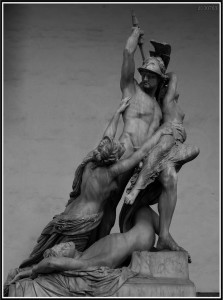 s watched mortals live their lives since the beginning of time, understands this about her hand-chosen triad. She who sees into the future knows how hard they will have to fight. She sends her beloved heroes into the deepest suffering, to the very portal of death, and she leaves them there, to either expire or claw their way to triumph. It's the only way.
s watched mortals live their lives since the beginning of time, understands this about her hand-chosen triad. She who sees into the future knows how hard they will have to fight. She sends her beloved heroes into the deepest suffering, to the very portal of death, and she leaves them there, to either expire or claw their way to triumph. It's the only way.
As a woman and an author, I was strongly affected by the Phantom of the Opera story, most notably Susan Kay's vision in her book, Phantom. The story of Erik, especially how he is born and what he endures as a baby, is unforgettable. Along with other influences, it swayed the way I wanted to tell my story, and Menoetius was the obvious choice to send into a life of struggle, of "what-ifs," and remorse.
Eventually, Aridela has to get past her immature adoration of physical beauty. If she doesn't, she will fail in the ultimate goal. She and her countrymen revere beauty in everything. Now here is this conundrum. Once, Menoetius was lively, charming, different from anything she has ever seen. She has never encountered or even imagined such an agony as this man suffered in her entire pampered life. It forces her to reexamine everything she has always taken for granted. Can she love something ugly? It's even a bit worse for both of them, as Menoetius did enjoy seventeen years of unmarred beauty, so there is a thread of regret neither can completely ignore.
Aridela has always been told she is wise and far seeing, insightful and clever. She believes it because this is reflected back at her every day. Athene, who knows what comes, wants her child to understand that what she's been told is not necessarily the truth. She wants more from all three of her chosen heroes.
I am often struck by how obsessed our own society is with beauty, to the point where women are spending great sums and suffering terrible pain to reconstruct and transform everything they can, often turning themselves into odd-looking almost alien beings in a desperate quest for perfect beauty. Menoetius's wounds, and the growth Aridela experiences because of them, is a strong underlying theme in the Bronze Age segment of the series—and beyond.
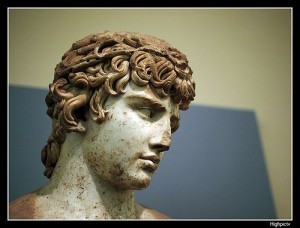 Menoetius's biggest flaw isn't the scarring from the attack. It's that he creates and magnifies his own misery. He assumes he knows what people feel about him, and he pushes everyone away without giving them a chance. Aridela is too young and inexperienced to understand this, so she takes it all very personally. Selene, the Phrygian warrior, is the only one who does understand. She slips through his barriers and begins the healing process—a necessary step to help him dig his way out of his second biggest flaw: the loss of his courage. Somehow, Menoetius's courage must be reacquired, so that when it comes time, he will know what to do, and he will have the strength to do it.
Menoetius's biggest flaw isn't the scarring from the attack. It's that he creates and magnifies his own misery. He assumes he knows what people feel about him, and he pushes everyone away without giving them a chance. Aridela is too young and inexperienced to understand this, so she takes it all very personally. Selene, the Phrygian warrior, is the only one who does understand. She slips through his barriers and begins the healing process—a necessary step to help him dig his way out of his second biggest flaw: the loss of his courage. Somehow, Menoetius's courage must be reacquired, so that when it comes time, he will know what to do, and he will have the strength to do it.
Divine Athene is patient. She realizes it will take a long time to prepare them. Again and again, she sets these three upon widely diverging paths. She doesn't guide them: she leaves it up to them to make their own choices. For an Immortal, thousands of years mean nothing.
The only way Menoetius can earn Athene's forgiveness and put the world to rights is to face the lion. Can he do it? Or will he leave Aridela to whatever fate might come at his brother's hands? Ah, that is the question, dear reader.
About Rebecca
Welcome. I'm the author of "The Child of the Erinyes" series, which follows a woman and her two lovers through time, beginning in the Bronze Age and finishing up in the near future. Historical fiction, fantasy and pre-Hellenic Greek myth, all rolled up together. (Oh and yes, romance.) To quote the YouTube trailer: "Smart young princess. Hunky macho warriors. Exotic island paradise. Politics, natural disasters, and forbidden love. An epic story. What more could a reader want?"
Visit Rebecca's website to learn more. The Year-god's Daughter is available in paperback and eBook formats. The sequel, The Thenara King, is set for release in April 2012. (I'm very excited about this.)
Flawed heroes – part three
from The Bruce Trilogy:
The Crown in the Heather, Worth Dying For, and The Honor Due a King
by N. Gemini Sasson
***This post originally appeared on N. Gemini Sasson's Blog***
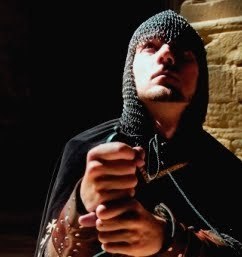 We could discuss the (exemplary) archetypal hero vs. the (contrary) antihero, but what about those protagonists who fall somewhere in between? As in reality, literary persona run the gradient of good and bad traits. For those of you who have read Bernard Cornwell's Saxon Tales, Uhtred Uhtredson of Bebbenburg, on first impression, is about as antihero as you can get. He's cynical, ruthless, and far from being the romantic type. But over the course of the stories, you see a clear pattern evolve – he keeps his word, he's courageous and he's more than willing to take action to get what he wants. And that makes him admirable.
We could discuss the (exemplary) archetypal hero vs. the (contrary) antihero, but what about those protagonists who fall somewhere in between? As in reality, literary persona run the gradient of good and bad traits. For those of you who have read Bernard Cornwell's Saxon Tales, Uhtred Uhtredson of Bebbenburg, on first impression, is about as antihero as you can get. He's cynical, ruthless, and far from being the romantic type. But over the course of the stories, you see a clear pattern evolve – he keeps his word, he's courageous and he's more than willing to take action to get what he wants. And that makes him admirable.
Perfect heroes are boring. Let's face it – Prince Charming is very one dimensional. He's handsome, he's rich and his kiss alone can wake Sleeping Beauty from a seemingly interminable coma. All very convenient for our wilting maiden, but in fairy tales like that, it's external circumstances, not the characters themselves, that need to be overcome for a happy ending.
As we get older, we come to realize perfect people don't exist. And in real life, happy endings aren't always guaranteed. We can identify with flawed characters. We feel their angst, understand their fears. We root for them. Cheer when they succeed. Mourn when they fail.
When I started to write The Bruce Trilogy, the first chapter I put down was about ten-year old James Douglas, standing on the parapets of Berwick at his father's side, witnessing the assault on the castle and subsequent massacre led by the ruthless Edward I (Longshanks) of England. That event – the atrocities and his father's humbling submission – determined his life's path. It filled him with the want for retribution, hatred for his enemies, and the determination to put things right in the only way he knew how – by force of arms. Unfortunately, being so young then, he could only bide his time. How serendipitous that when he finally came of age, Robert the Bruce was making a bid for the crown of Scotland. He became King Robert's most loyal soldier and, renowned for his cunning and stealth, was given command at a young age.
Perfect? Hardly. He was right for the role he played in Scotland's history, but as a man he was an imperfect being. What few descriptions we have of him are that he spoke with a lisp and then not often. One gets the impression that he was shy with words, maybe even a little uncomfortable in social situations with the opposite sex, even though his male friendships were like Super-Glue bonds. I focused a lot on this awkwardness in The Honor Due a King, where his reticence keeps the woman he loves at bay, and his loyalty conflicts, more than once, with winning his life's love. Even as I was writing him, I kept wanting to grab him by the collar and say, "Speak up, man! How is anyone supposed to know how you feel if you keep pushing it back down inside you and denying it? You deserve her. Go for it, will you?"
In time, his loyalty and thirst for revenge became traits that even he began to question. Numerous times he recaptured, ruined and even razed his own boyhood home, Douglas Castle, because he did not want the English to have it.
As for the girl – well, I won't tell you if he gets her in the end. You'll have to read the book to find out.
P.S. The guy on the cover of The Bruce Trilogy books – that's James Douglas. But if you've been thinking all along that it's Robert the Bruce, please continue to do so.
Happy reading,
Gemi
 N. Gemini Sasson writes historical fiction set in medieval Scotland and England, including Isabeau, A Novel of Queen Isabella and Sir Roger Mortimer (2011 IPPY Silver Medalist for Historical Fiction), and the books of The Bruce Trilogy: The Crown in the Heather, Worth Dying For, and The Honor Due a King. You can learn more about Gemini and her work at her website. Her books are available in paperback and eBook formats.
N. Gemini Sasson writes historical fiction set in medieval Scotland and England, including Isabeau, A Novel of Queen Isabella and Sir Roger Mortimer (2011 IPPY Silver Medalist for Historical Fiction), and the books of The Bruce Trilogy: The Crown in the Heather, Worth Dying For, and The Honor Due a King. You can learn more about Gemini and her work at her website. Her books are available in paperback and eBook formats.
February 14, 2012
Flawed heroes – part two
From Artemis Rising
by Cheri Lasota
***This post originally appeared on N. Gemini Sasson's Blog***
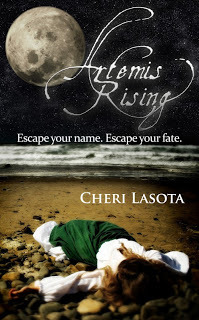 When my dear friend Gemi asked me to post about my "imperfect hero" Tristan Vazante, I thought: What a brilliant idea! We adore our fictional heroes as we read them and write them and daydream about them. Yet, oftentimes, we gloss over their imperfections and impatiently await the story's happy ending—something we wish for ourselves vicariously through our characters. So much of how stories affect us comes down to reader expectation. Most genre fiction "requires" a happy ending (even series books) despite the sufferings and betrayals we put our characters through. But if we only wrote perfect characters, where would the story be?
When my dear friend Gemi asked me to post about my "imperfect hero" Tristan Vazante, I thought: What a brilliant idea! We adore our fictional heroes as we read them and write them and daydream about them. Yet, oftentimes, we gloss over their imperfections and impatiently await the story's happy ending—something we wish for ourselves vicariously through our characters. So much of how stories affect us comes down to reader expectation. Most genre fiction "requires" a happy ending (even series books) despite the sufferings and betrayals we put our characters through. But if we only wrote perfect characters, where would the story be?
We all go through experiences of deep betrayal and hurt in our lives, usually at the hand of those we love most. And much of what draws us to fiction is the ability to see how others deal with the problems we have had. How do they survive pain, cruelty and abuse and come out stronger than ever? Just as our dreams let our subconscious work out problem-solving situations, I attest that fiction does the same thing in our waking hours, albeit with a little more sense!
Fiction may be fantasy, but it often explores the most raw and universal truths about the dark side of humanity. When we read, we work on these societal problems within the context and safety of a world that does not exist. This helps us to process situations we may not be able to face otherwise. Besides entertainment, fiction has had the power to move us to action within our own lives. It empowers, enlightens and reveals. The pen truly is mightier than the sword!
My you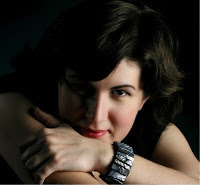 ng Azorean Islander Tristan Vazante is an amalgam of many different people: the Knight Tristan of Cornwall (Arthurian legend), the Greek God Alpheus (to add a bit more of a dark side), pieces of several different beloved characters from other novels and films, and even parts of men I've known throughout my life. Most importantly, I needed to make sure that his personality and beliefs matched the time period and location in which he lived (1880s Azores Islands): deeply religious, kind and welcoming, salt of the earth.
ng Azorean Islander Tristan Vazante is an amalgam of many different people: the Knight Tristan of Cornwall (Arthurian legend), the Greek God Alpheus (to add a bit more of a dark side), pieces of several different beloved characters from other novels and films, and even parts of men I've known throughout my life. Most importantly, I needed to make sure that his personality and beliefs matched the time period and location in which he lived (1880s Azores Islands): deeply religious, kind and welcoming, salt of the earth.
That's quite a patchwork quilt of a character, eh? This was all quite purposeful, because I knew my tendency was to protect him from harm, as he was my favorite character in the book. When I create any character, there are a few specific characteristics I give all of them before I can really get a sense of who they are. Here were Tristan's:
• Greatest strength: self-sacrifice
• Greatest need/desire: the heroine, Arethusa, of course! =)
• Childhood trauma: loss of mother
• Deepest secret: his origins
• Fatal flaw: lack of loyalty
Tristan's traits needed to both compliment and contrast with my heroine's characteristics, so the characters could attract and repel each other at different points in the story. Early on in drafting Artemis Rising, Tristan's main flaw was that he had no flaw. So I worked hard at creating a more complex background and personality for him.
In the end, his fatal flaw—lack of loyalty—tested the characters' love right down to its foundations. The scene in which it is most forcefully illustrated appears to touch my readers deeply. Could this be perhaps because they recognize and remember such pain in their own lives? Certainly that scene fulfills that purpose for me. I remember, too, how difficult that scene was to write. It brought me to tears that day and it still does when I re-read it. And for some readers it does the same. There is a catharsis in seeing our own experiences laid bare in the life of another, fictional or otherwise. It helps us make sense of the madness and frailty of human nature and accept it for what it is.
Later on Tristan's loyalty is tested once again. And this brings me to an important point. Writers seem to know inherently that if a character fails his first test, he'll need to be tested again. The second time, a hero has to learn from his previous mistake. Or if he doesn't, he becomes more of an anti-hero.
The beauty in Tristan for me is that he is always a hero, despite his imperfections. He has a moment of weakness—and it's big one—but it doesn't destroy his honor permanently. For me, he represents the epitome of hope: despite our flaws we can still be redeemed. This is such an important message for me personally. He reminds me of this every time I think about him. And isn't that a mark of a good character? You remember him long after the book ends. Here's hoping he nestles in your heart as much as he did mine. *sigh*
You can learn more about Cheri, and her book Artemis Rising, on her website. Artemis Rising is available in all eBook formats and is shortly to be released in paperback.
February 13, 2012
Flawed heroes – part one
from
V.R. Christensen
Perfect people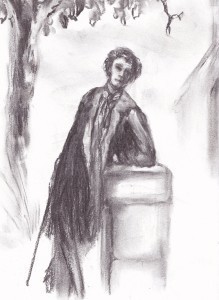 are boring. I cannot understand them (because I don't know any, myself) and I cannot sympathise with them. I do, however, have a deep appreciation for those who strive to be good, despite their weaknesses, despite their downfalls. A hero who is too good is unbelievable, and yet…one that is too flawed…well, they are difficult to root for. It's hard to find that balance.
are boring. I cannot understand them (because I don't know any, myself) and I cannot sympathise with them. I do, however, have a deep appreciation for those who strive to be good, despite their weaknesses, despite their downfalls. A hero who is too good is unbelievable, and yet…one that is too flawed…well, they are difficult to root for. It's hard to find that balance.
I acquired, several years ago, a very battered collection of George Meredith's works, and I've been trying to read my way through them. He writes such amazing women, strong and good, if sometimes rebellious, which I like. That was quite a flaw in the Victorian era, female independence, you know. And his heroes? They are equally flawed. Perhaps more so. Richard Feverel (The Ordeal of Richard Feverel) for example is too obedient and it becomes a tragic flaw. And yet you follow him with rapt fascination toward and into that tragedy. Evan Harrinton, on the other hand, is what they call a 'managed man'. His elder sister tells him what to do and where to go and whom to love and what to make of his life. And for the most part he does it. And when he doesn't want to do it, he wallows around feeling sorry for himself and wondering why he cannot get up the gumption to stand up to her. I found him difficult to sympathise with. Perhaps because I'm a woman with a fiercely independent spirit. But it is, nevertheless, a truism that those who must fight for what they want appreciate it most, while those by nature blessed rarely take full advantage of their opportunities. At any rate, Evan was a difficult book to engage in.
And so I knew, when it came time for me to write of my own 'managed man' that I had to walk a fine line.
Archer Hamilton is young and he has much of youthful ambition and willfulness about him. And yet he doesn't always use these to the best effect. He is controlled, manipulated by his uncle who has raised him, and who has raised him to believe he will inherit…if he observes his duty. And chiefest of his duties is to marry a fortune. This is all well enough until he meets the unfortunate Miss Shaw, who he later learns is a servant in his uncle's house. He cannot marry her, and yet he is irresistibly drawn to her. He considers, and very seriously, breaking with his uncle over the matter, but then…he has no money of his own. He is powerless.
Miss Shaw, as it turns out, is not the penniless misfortunate she would like people to believe her, and when it is discovered she's actually the unwilling beneficiary of a sizable fortune, Archer's uncle arranges their marriage. Archer does not object, though he knows, for her sake, he should. He gives in to temptation and agrees to go along with it, but the blessing of having the woman he wants comes with an enormous price. He is now his uncle's puppet. Sir Edmund has seized the money and taken control of everything, and Archer is helpless now to do anything for himself. Neither has he the respect of his wife. And without this, perhaps the most important thing of all, he has nothing.
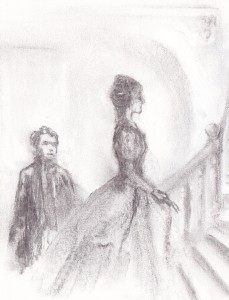 Archer is not entirely without strengths, however. From his mother he learned the value of earning the love and respect of others, which has been his primary motivation in remaining loyal to his uncle. Sir Edmund might, should Archer manage to please him, be the father he never had. More than anything, though, he must grow up, something he has so far not bee required to do, with everything he's ever needed handed to him on a plate. He learns, and quickly, the value of worthwhile loyalty, and that family pride, money, tradition, the opinion of the masses, these mean nothing when you have not the love and respect of those most important to you. For these he learns to fight, whatever the cost.
Archer is not entirely without strengths, however. From his mother he learned the value of earning the love and respect of others, which has been his primary motivation in remaining loyal to his uncle. Sir Edmund might, should Archer manage to please him, be the father he never had. More than anything, though, he must grow up, something he has so far not bee required to do, with everything he's ever needed handed to him on a plate. He learns, and quickly, the value of worthwhile loyalty, and that family pride, money, tradition, the opinion of the masses, these mean nothing when you have not the love and respect of those most important to you. For these he learns to fight, whatever the cost.
I am a champion of the underdog, of the honestly flawed. To have weaknesses and to be honest about them speaks of a person who is trying to do and be better, rather than pretending to be something he is not. I cannot help but respect that. It's true we have too few heroes in this world, but I'll take a flawed hero over a perfect one any day.
Of Moths & Butterflies is now available in paperback, as well as hardcover and eBook in all formats. Visit the home page of this site for links. Read an excerpt here. See the book trailer here.
February 9, 2012
A Valentine's Teaser
A very short excerpt of a short story I'm working on for the month of February. I don't know if I'll post the whole or not. I think not, as the month is very full as it is, and I'd like something to save as a surprise if I ever get around to doing a collection of short stories.
 hen I was thirteen, Lynford Townsend pushed me into the duck pond. I have never forgiven him.
hen I was thirteen, Lynford Townsend pushed me into the duck pond. I have never forgiven him.
Perhaps that is why, at the age of three and twenty, I am less than thrilled at the announcement that he and my baby sister, Celia, are engaged to marry. I should be happy. Why am I not happy? I love my sister. And Lynn, despite the duck pond incident, is one of my oldest and dearest friends. It isn't jealousy that keeps me from congratulating them wholeheartedly. I could never think of marrying him myself. And I told him so! It isn't only because Celia is so desperately in love with him (she always had been) that I could not consider him, but because I could never marry myself to a man who would purposefully push me into a body, however small, of stale and brackish water.
You might wonder what sort of occasion would have called for my telling him, as I did, that I could not think of marrying him. Possibly it was presumptuous, but I tell you it was only out of concern, for I thought I had perceived some slight hesitation on his part in offering to my sister. Perhaps I was mistaken. It has happened before.
The announcement has just been made, and well received. My smile is taught. I can feel it pulling at the corners of my eyes, willing them to cooperate in the gesture. They will not. A toast is offered. My sister blushes charmingly. Mr. Townsend is all pride and masculine conquest. Of course they have my blessing. I try harder to appear as sincerely happy for them as I want to feel.
After supper, the ladies withdraw. In the drawing room, Mama embraces Celia and sheds tears upon her fair and plated hair.
"Oh, Mama," my sister chides. "You make too much of it. You always knew it would happen. Admit it."
Mama, for some reason I cannot comprehend, gives me a surreptitious, yet sympathetic look before turning back to my dear sister. "Of course we did, my darling. Though we had begun to wonder… But now it is at last decided upon. You must allow me to be happy. It is my right, after all.
Celia shakes her head, sending the curls that frame her face bouncing. She kisses Mama again and rises to sit next to me. She takes my hand in hers. "You are not disappointed?"
"Don't be silly. Mr. Townsend is one of the best men I know. You could not do better."
"That was my thinking. But why must you speak so formally now? He has always been our dear Lynn, yours and mine, and always will be."
I ignore this last. "You know you've been in love with him for an age. Why shouldn't you have your heart's desire? You deserve to be happy."
"Yes," she said, her smile faltering ever so slightly. "I had always thought he liked you better, you know."
"Don't be absurd. We can't get on for five minutes together. And you know me. Being liked isn't enough. I want to be adored. Truly, I wish you and Mr.— and our Lynn every happiness. He is quite happy, it is plain to see."
"Do you think so?"
"It's written all over his face. Did you not see how proud of himself he is for catching you? You'll make him very happy. And he you, I'm quite certain."
"I do hope so," Celia answered, and looked as if she might begin to cry.
"At least I doubt very much he will ever be tempted to throw you into the pond."
"What can you mean?" Celia said and looked confused. "Surely you don't mean to say you still—"
But before she could finish the question, which I'm not sure I would have answered in any event, the men entered.



